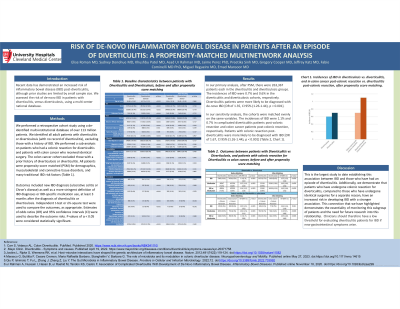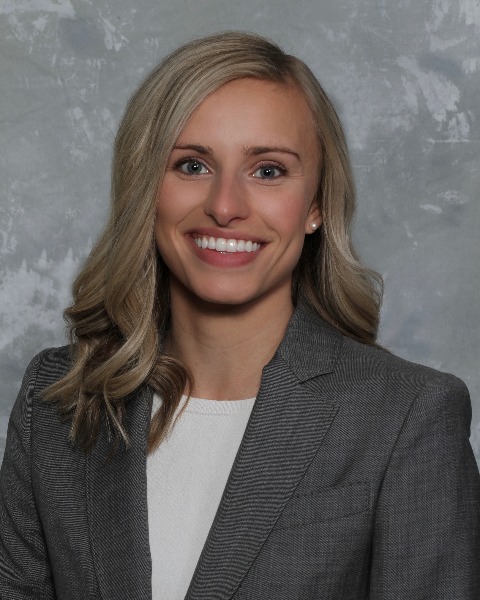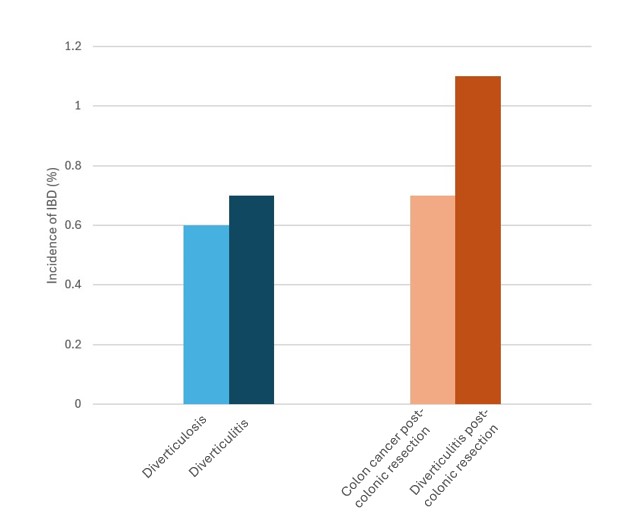Tuesday Poster Session
Category: IBD
P4322 - Risk of De-Novo Inflammatory Bowel Disease in Patients After an Episode of Diverticulitis: A Propensity-Matched Multi-Network Analysis
Tuesday, October 29, 2024
10:30 AM - 4:00 PM ET
Location: Exhibit Hall E

Has Audio

Elise Roman, MD
University Hospitals Cleveland Medical Center
Bay Village, OH
Presenting Author(s)
Elise Roman, MD1, Sydney Donohue, MD2, Khushbu Patel, MD2, Asad Ur Rahman, MD3, Jaime A. Perez, PhD4, Preetika Sinh, MD5, Gregory Cooper, MD6, Jeffry Katz, MD6, Fabio Cominelli, MD, PhD6, Miguel D Regueiro, MD7, Emad Mansoor, MD6
1University Hospitals Cleveland Medical Center, Cleveland, OH; 2University Hospitals Cleveland Medical Center, Case Western Reserve University, Cleveland, OH; 3Cleveland Clinic Florida, Weston, FL; 4University Hospitals Clinical Research Center, Cleveland, OH; 5Medical College of Wisconsin, Milwaukee, WI; 6Digestive Health Institute, University Hospitals Cleveland Medical Center, Cleveland, OH; 7Cleveland Clinic, Cleveland, OH
Introduction: Recent data has demonstrated an increased risk of inflammatory bowel disease (IBD) post-diverticulitis, although prior studies are limited by small sample size. We assessed the risk of de-novo IBD in patients with diverticulitis, versus diverticulosis, using a multi-center national database.
Methods: We performed a retrospective cohort study using a multi-institutional database of over 113 million patients. We identified all adult patients with diverticulitis or diverticulosis (without diverticulitis), excluding those with a history of IBD. All patients were propensity-score matched (PSM) for demographics, connective tissue disorders, and traditional IBD risk factors (Table 1).
To assess the impact of complicated diverticulitis requiring surgery on the risk of IBD, we performed a sensitivity analysis on diverticulitis patients who had had a colonic resection and compared them to patients with colon cancer who received identical surgery, to assess the outcome of new IBD post-surgery.
Outcomes included new IBD diagnosis (ulcerative colitis or Crohn’s disease) at least 3 months after a diagnosis of diverticulosis or diverticulitis, or colonic resection.
Independent t-test or chi-square test were used to compare the outcomes, as appropriate. Estimates of odds ratios (OR) and 95% confidence intervals (CI) were used to describe the outcome risks.
Results: In our primary analysis, after PSM, there were 263,367 patients each in the diverticulitis and diverticulosis groups. The incidences of IBD were 0.7% and 0.6% in the diverticulitis and diverticulosis cohorts, respectively. Diverticulitis patients were more likely to be diagnosed with de-novo IBD [OR of 1.35, CI 95% (1.26-1.44), p < 0.001].
In our sensitivity analysis, the cohorts were matched evenly on the same variables. The incidences of IBD were 1.1% and 0.7% in complicated diverticulitis patients post-colonic resection and colon cancer patients post-colonic resection, respectively. Patients with colonic resection post-diverticulitis were more likely to be diagnosed with IBD [OR of 1.67, CI 95% (1.26-1.44), p < 0.001] (Chart 1).
Discussion: In this large retrospective study, we found an increased risk of de novo IBD in patients post-diverticulitis versus diverticulosis alone. This association was stronger in the colonic resection cohorts. Further prospective studies are needed to confirm these findings and clinicians should have a low threshold for evaluating diverticulitis patients for IBD if new gastrointestinal symptoms arise.

Note: The table for this abstract can be viewed in the ePoster Gallery section of the ACG 2024 ePoster Site or in The American Journal of Gastroenterology's abstract supplement issue, both of which will be available starting October 27, 2024.
Disclosures:
Elise Roman, MD1, Sydney Donohue, MD2, Khushbu Patel, MD2, Asad Ur Rahman, MD3, Jaime A. Perez, PhD4, Preetika Sinh, MD5, Gregory Cooper, MD6, Jeffry Katz, MD6, Fabio Cominelli, MD, PhD6, Miguel D Regueiro, MD7, Emad Mansoor, MD6. P4322 - Risk of De-Novo Inflammatory Bowel Disease in Patients After an Episode of Diverticulitis: A Propensity-Matched Multi-Network Analysis, ACG 2024 Annual Scientific Meeting Abstracts. Philadelphia, PA: American College of Gastroenterology.
1University Hospitals Cleveland Medical Center, Cleveland, OH; 2University Hospitals Cleveland Medical Center, Case Western Reserve University, Cleveland, OH; 3Cleveland Clinic Florida, Weston, FL; 4University Hospitals Clinical Research Center, Cleveland, OH; 5Medical College of Wisconsin, Milwaukee, WI; 6Digestive Health Institute, University Hospitals Cleveland Medical Center, Cleveland, OH; 7Cleveland Clinic, Cleveland, OH
Introduction: Recent data has demonstrated an increased risk of inflammatory bowel disease (IBD) post-diverticulitis, although prior studies are limited by small sample size. We assessed the risk of de-novo IBD in patients with diverticulitis, versus diverticulosis, using a multi-center national database.
Methods: We performed a retrospective cohort study using a multi-institutional database of over 113 million patients. We identified all adult patients with diverticulitis or diverticulosis (without diverticulitis), excluding those with a history of IBD. All patients were propensity-score matched (PSM) for demographics, connective tissue disorders, and traditional IBD risk factors (Table 1).
To assess the impact of complicated diverticulitis requiring surgery on the risk of IBD, we performed a sensitivity analysis on diverticulitis patients who had had a colonic resection and compared them to patients with colon cancer who received identical surgery, to assess the outcome of new IBD post-surgery.
Outcomes included new IBD diagnosis (ulcerative colitis or Crohn’s disease) at least 3 months after a diagnosis of diverticulosis or diverticulitis, or colonic resection.
Independent t-test or chi-square test were used to compare the outcomes, as appropriate. Estimates of odds ratios (OR) and 95% confidence intervals (CI) were used to describe the outcome risks.
Results: In our primary analysis, after PSM, there were 263,367 patients each in the diverticulitis and diverticulosis groups. The incidences of IBD were 0.7% and 0.6% in the diverticulitis and diverticulosis cohorts, respectively. Diverticulitis patients were more likely to be diagnosed with de-novo IBD [OR of 1.35, CI 95% (1.26-1.44), p < 0.001].
In our sensitivity analysis, the cohorts were matched evenly on the same variables. The incidences of IBD were 1.1% and 0.7% in complicated diverticulitis patients post-colonic resection and colon cancer patients post-colonic resection, respectively. Patients with colonic resection post-diverticulitis were more likely to be diagnosed with IBD [OR of 1.67, CI 95% (1.26-1.44), p < 0.001] (Chart 1).
Discussion: In this large retrospective study, we found an increased risk of de novo IBD in patients post-diverticulitis versus diverticulosis alone. This association was stronger in the colonic resection cohorts. Further prospective studies are needed to confirm these findings and clinicians should have a low threshold for evaluating diverticulitis patients for IBD if new gastrointestinal symptoms arise.

Figure: Chart 1. Incidences of IBD in diverticulosis vs. diverticulitis, and in colon cancer post-colonic resection vs. diverticulitis post-colonic resection, after propensity score matching.
Note: The table for this abstract can be viewed in the ePoster Gallery section of the ACG 2024 ePoster Site or in The American Journal of Gastroenterology's abstract supplement issue, both of which will be available starting October 27, 2024.
Disclosures:
Elise Roman indicated no relevant financial relationships.
Sydney Donohue indicated no relevant financial relationships.
Khushbu Patel indicated no relevant financial relationships.
Asad Ur Rahman indicated no relevant financial relationships.
Jaime Perez indicated no relevant financial relationships.
Preetika Sinh: Bristol Myers Squibb – Advisory Committee/Board Member.
Gregory Cooper indicated no relevant financial relationships.
Jeffry Katz indicated no relevant financial relationships.
Fabio Cominelli indicated no relevant financial relationships.
Miguel D Regueiro: AbbVie – Advisory Committee/Board Member, Consultant, Speakers Bureau.
Emad Mansoor: Lilly – Speakers Bureau. Takeda – Speakers Bureau.
Elise Roman, MD1, Sydney Donohue, MD2, Khushbu Patel, MD2, Asad Ur Rahman, MD3, Jaime A. Perez, PhD4, Preetika Sinh, MD5, Gregory Cooper, MD6, Jeffry Katz, MD6, Fabio Cominelli, MD, PhD6, Miguel D Regueiro, MD7, Emad Mansoor, MD6. P4322 - Risk of De-Novo Inflammatory Bowel Disease in Patients After an Episode of Diverticulitis: A Propensity-Matched Multi-Network Analysis, ACG 2024 Annual Scientific Meeting Abstracts. Philadelphia, PA: American College of Gastroenterology.
